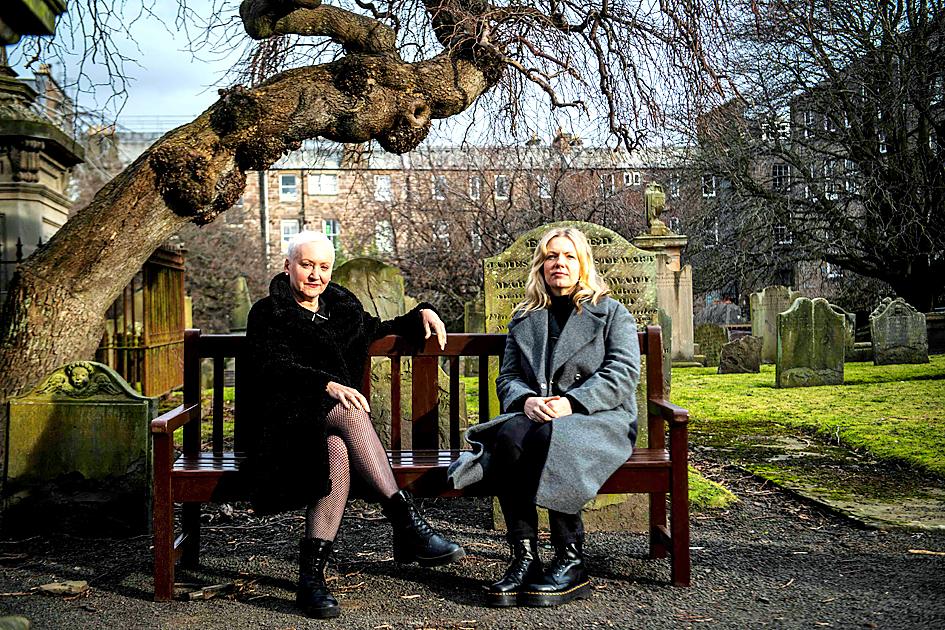The failure to serve posthumous justice to the thousands of people — mainly women — persecuted as witches in post-Reformation Scotland “prolongs misogyny,” a Scottish lawmaker launching a bid to grant them a legal pardon has said.
“The only way we can move forward in terms of where we are with misogyny and prejudice in society is by fixing these injustices of our past,” Scottish National Party lawmaker Natalie Don said, ahead of yesterday’s launch of a Scottish Parliament member’s bill.
She also hoped that the bill could contribute to awareness of parts of the world where women and girls still face such accusations and their violent consequences, she said.

Photo: AFP
A pardon for the 4,000 people tortured and often executed under the Witchcraft Act of 1563 would be a collective rejection of misogynistic attitudes in the past and the present, Don said.
She believes the campaign for acknowledgment of the historical femicide has gained traction in the past few years because of its contemporary resonance.
“Specific kinds of women that were targeted, generally because they were a little bit different, they were poor, they were outcasts. We still see that in the modern day — although it’s maybe not the same characteristics — where women who do choose to be different or independent feel men’s anger,” she said.
When Scottish First Minister Nicola Sturgeon issued a formal apology to those affected on International Women’s Day in March, she said that the “deep misogyny” motivating the Witchcraft Act had not been consigned to history.
“Today it expresses itself not in claims of witchcraft, but in everyday harassment, online rape threats and sexual violence,” Sturgeon said.
The launch was welcomed by Queen’s Counsel Claire Mitchell of the Witches of Scotland campaign, which has led calls for an apology and pardon.
“This is a way for people in the 21st century to acknowledge and to have their say in pardoning those who suffered the most grave miscarriage of justice centuries before,” she said.
Momentum for national acknowledgment continues to grow, with the charity Remembering the Accused Witches of Scotland last month securing an apology from the Church of Scotland for its central role in the persecution, and has now identified a possible location for a national memorial in Fife, the locus of much of Scotland’s witch panic.
The bill is launched amid a swell of grassroots groups researching local prosecutions and organizing community memorials.

POLITICAL PRISONERS VS DEPORTEES: Venezuela’s prosecutor’s office slammed the call by El Salvador’s leader, accusing him of crimes against humanity Salvadoran President Nayib Bukele on Sunday proposed carrying out a prisoner swap with Venezuela, suggesting he would exchange Venezuelan deportees from the US his government has kept imprisoned for what he called “political prisoners” in Venezuela. In a post on X, directed at Venezuelan President Nicolas Maduro, Bukele listed off a number of family members of high-level opposition figures in Venezuela, journalists and activists detained during the South American government’s electoral crackdown last year. “The only reason they are imprisoned is for having opposed you and your electoral fraud,” he wrote to Maduro. “However, I want to propose a humanitarian agreement that

ECONOMIC WORRIES: The ruling PAP faces voters amid concerns that the city-state faces the possibility of a recession and job losses amid Washington’s tariffs Singapore yesterday finalized contestants for its general election on Saturday next week, with the ruling People’s Action Party (PAP) fielding 32 new candidates in the biggest refresh of the party that has ruled the city-state since independence in 1965. The move follows a pledge by Singaporean Prime Minister Lawrence Wong (黃循財), who took office last year and assumed the PAP leadership, to “bring in new blood, new ideas and new energy” to steer the country of 6 million people. His latest shake-up beats that of predecessors Lee Hsien Loong (李顯龍) and Goh Chok Tong (吳作棟), who replaced 24 and 11 politicians respectively

Young women standing idly around a park in Tokyo’s west suggest that a giant statue of Godzilla is not the only attraction for a record number of foreign tourists. Their faces lit by the cold glow of their phones, the women lining Okubo Park are evidence that sex tourism has developed as a dark flipside to the bustling Kabukicho nightlife district. Increasing numbers of foreign men are flocking to the area after seeing videos on social media. One of the women said that the area near Kabukicho, where Godzilla rumbles and belches smoke atop a cinema, has become a “real

‘POINT OF NO RETURN’: The Caribbean nation needs increased international funding and support for a multinational force to help police tackle expanding gang violence The top UN official in Haiti on Monday sounded an alarm to the UN Security Council that escalating gang violence is liable to lead the Caribbean nation to “a point of no return.” Special Representative of the UN Secretary-General for Haiti Maria Isabel Salvador said that “Haiti could face total chaos” without increased funding and support for the operation of the Kenya-led multinational force helping Haiti’s police to tackle the gangs’ expanding violence into areas beyond the capital, Port-Au-Prince. Most recently, gangs seized the city of Mirebalais in central Haiti, and during the attack more than 500 prisoners were freed, she said.